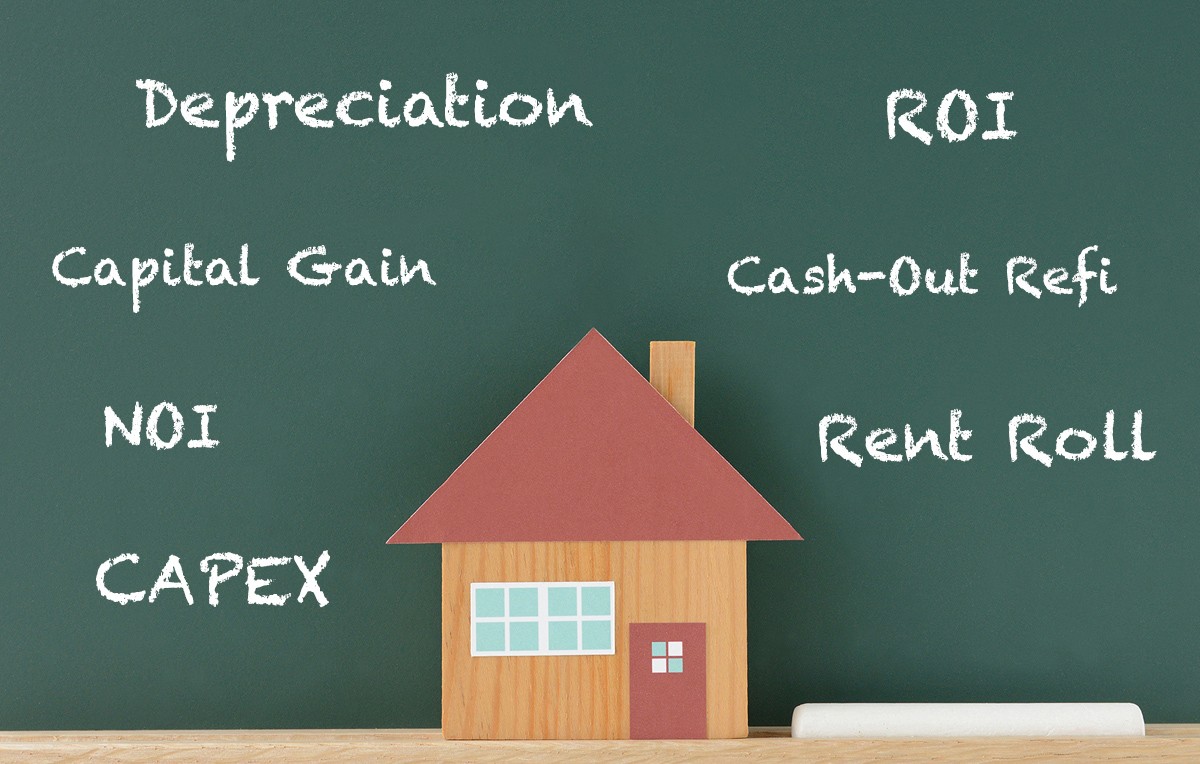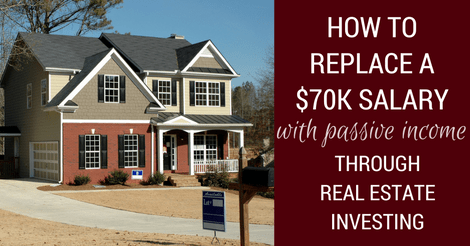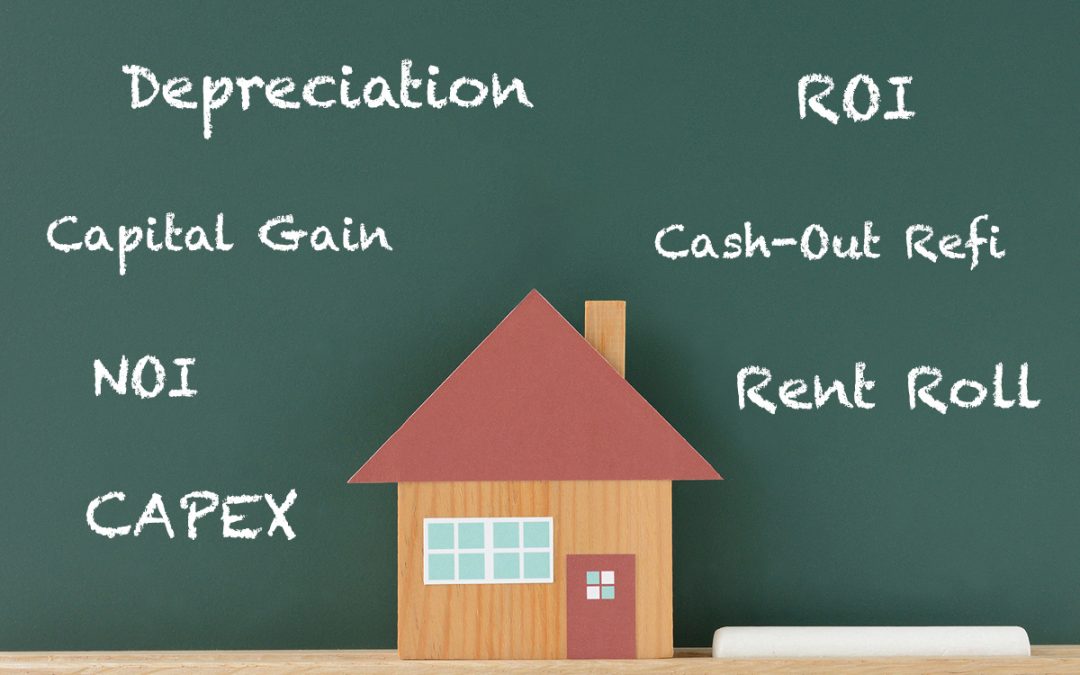
If you’re not up to speed with basic real estate terminology and lingo, and therefore feel out of place when discussing the topic with seasoned investors, this article will level the playing field for you!
I’ve been in the rental real estate business for many years now, but I remember what it was like when I was just starting out. I recall times when I was unable to provide input because I was unsure if I was using the correct vocabulary. With that said, I can appreciate how helpful a quick guide to real estate jargon can be for those who would like to become a successful investor, and be able to join in on casual or business conversations on industry-related topics.
Common Real Estate Terms & Definitions
Real estate investing can be a bit confusing for someone who is just starting out; add on top of that a new set of real estate investment vocabulary words to learn, acronyms to look up, and definitions to remember. But don’t worry; we are here to make the learning process easier for you with our glossary of real estate terminology that you can bookmark and reference when needed.
Let’s dive in so you can speak with confidence at your next real estate investing meet-up!
1. Capital Gain
When you own an asset such as a piece of real estate, and there is an increase in its value due to appreciation, renovations, and so on, when that asset is sold for more than the original purchase price, a gain is then realized, and is referred to as a capital gain.
Capital gains must be reported to the IRS, and they are then taxed as short-term or long-term capital gains. Holding an asset for a longer period of time can be beneficial due to the fact that long-term investments get a bigger tax break. We have written an entire article on capital gains taxes that can provide you with some smart financial tips – A Guide to Capital Gains Tax – Rates & Reduction Strategies.
2. Depreciation
The real estate term depreciation refers to a non-cash deduction that greatly reduces an investor’s taxable income. It allows the investor to deduct a percentage of the cost basis each year over the useful life (27.5 years) of the rental property.
The IRS allows for depreciation because it’s assuming the property will deteriorate and be worth less as the years go by. Most likely, the property will actually increase in value over time, not decline, but as investors, we are happy to depreciate the property anyway. With that said, be sure to keep this real estate glossary term in the forefront of your mind come tax time.
There is a lot more to depreciation, and it’s worth looking into. For instance, when you purchase a new construction rental property, the tax savings are incredible because you can take advantage of a cost segregation study which allows for depreciating much more than just the building structure itself. Take a look at our detailed article on the topic, The Power of a New Construction Cost Segregation Study Can Save You Thousands.
Take a moment to watch this video that gives more details on depreciation:
3. Operating Expenses
When you own investment real estate, you will have certain expenses that help maintain and manage the property; this is known as operating expenses, and also referred to as operating costs.
Below you will find a few of the most common operating expenses:
- Property Repairs Such as Contractor Fees and Supplies
- General Maintenance
- Professional Property Management Fees
- Property Insurance
- Legal Services
- Rental Property Advertising
- Property Taxes
- Casualty Losses Not Covered by Insurance
- Closing Costs for Same Tax Year Purchases
- Mortgage Interest
- Business Travel and Meeting Expenses
Operating costs are not typically considered too much of a financial burden because they can be used as a write-off, and can therefore greatly lower your tax burden, which can increase your ROI.
If you want to be on top of your game regarding your tax strategy, I suggest picking up this book that I have personally read several times; you can buy it from Amazon – Tax-Free Wealth. In addition to this, we use Tom Wheelwright for all our tax needs; you can schedule a call through the WealthAbility website if you’re in need of an experienced CPA that’s familiar with real estate tax strategies.
4. Net Operating Income (NOI)
The acronym NOI, which stands for net operating income, is the income you have remaining once all your operating expenses, and other income lowering factors have been subtracted. This is important to understand because if you make, let’s say, $70,000 in rental income for the year, and you subtract all your allowable expenses, and are left with a net operating income of $20,000, that’s what you will be taxed on. However, if you don’t factor in any expenses, you will be taxed on the full $70,000.
Simple Net Operating Income Formula:
Rental Property Revenue – Operating Expenses = NOI
5. Return on Investment (ROI)
If you only remember one key real estate investing term in this article, it should be ROI. The acronym ROI stands for return on investment, and should be the focus of everything you do in your property investment business. It’s basically a calculation of how much money you put into a property, and how much you get out of it, and it’s a great way to measure profitability. Your goal as an investor should be to achieve a high return on investment. There are different formulas out there for calculating ROI, but you can read up on how I calculate my return on investment by visiting our post titled The 411 on ROI.
6. Cash-on-Cash Return (COC)
COC stands for cash-on-cash return, and it’s used to calculate the money an investor has earned on the actual cash that was invested into an asset. To come up with your COC, you divide the annual pre-tax income by the actual cash invested. Real estate investors use this formula to determine what they may earn for the cash they put into an asset, and they also use it to pre-screen properties for an adequate cash flow, or to see if a property is undervalued.
7. Pro Forma
The term pro forma, as it applies to real estate, refers to a way of calculating and analyzing a property’s potential or current financials, such as cash flow, ROI, and expenses. A pro forma statement often lists actual and projected financials. Items that are commonly factored in are potential rental income, vacancy rates, expenses such as property repairs, management fees, and more.
8. Capital Expenditure (CAPEX)
CAPEX is an acronym that stands for capital expenditure. It represents expenses that can improve and extend the useful life of an asset, such as a rental property. This may include roof replacement, a new HVAC system, plumbing and electrical, flooring, windows, and more. Incidental repair and routine maintenance, such as paint touch-ups and professional carpet cleaning upon move-outs, or simple appliance repairs, are not considered capital expenditures.
Many investors set aside 15% of their income in a CAPEX account for future repairs. Personally, I don’t because I renovate my properties to minimize big-ticket repairs. View our video titled How to Renovate a Rental Property to Minimize Repairs for some helpful tips.
9. Rent Roll
A rent roll is a document that real estate investors use which captures the rental income and tenant information for single or multi-family rentals, apartments, or a portfolio of properties. It can serve as a financial report that reveals current and projected cash. It can be useful to property owners to determine how their rentals are performing. Additionally, lenders find a rent roll useful when determining if a loan should be granted, and this real estate term is commonly used throughout the industry.
A rent roll may contain information on the property itself, such as the address, type of property, lot size, square footage, and more. It will also have information on the tenants which would be their name, monthly rent, due date, lease start and end date, security deposit information, and the like.
10. Tenant Turnover
This is when a tenant permanently vacates your property, and you prepare the property for the next tenant. For some, tenant turnovers can end up being one of their biggest expenses because it can include such things as multiple months’ worth of lost income if it takes a while to find a new tenant, cleaning costs, repair costs, marketing and application fees, as well as administrative costs. Take a look at our article titled What to Expect During a Tenant Turnover for information to help you prepare if a tenant leaves.
11. Lease-Up Fee
During a tenant turnover, you can expect to pay a lease-up fee to your property management company. Some investors pay the equivalent of their monthly rent, or 50% of it for the lease-up fee. This fee covers the property management company’s expenses to find a new tenant, including background checks, employment verification, and more. If you don’t have a property manager, it would be a wise decision to hire one so they can take care of the tenant turnovers on your behalf, as well as care for your property and tenants. You can learn more on why this is a good idea in our latest article titled 7 Reasons Why Hiring a Property Management Company will Put More Money in Your Pocket.
12. Cash-Out Refinance
Investors who already own one or a few rental properties can use what is called a cash-out refinance to help fund their next rental real estate purchase. This particular type of loan strategy is utilized by refinancing an existing property loan and receiving an amount that is more than what is currently owed on the mortgage loan, which is possible when equity has been built up.
The investor uses the loan to pay off the existing mortgage and keeps the difference for investing in an additional property. New investors should become familiar with this real estate vocabulary word and its definition because it can be utilized to quickly grow a portfolio. Also, it’s commonly used with the BRRRR strategy, and you can learn more about it in our post, The BRRRR Method for Real Estate Investing.
Be sure to watch our video on using a cash-out refinance:
13. Amortization
Amortization is a term used to describe the process of setting up a mortgage loan schedule that ensures the loan payments are the same each month, and therefore predictable. When a loan is not amortized, the payments would vary each month. Why is this the case? Because the interest on a loan can change each month since that interest is calculated off of the principal amount, and the principal changes and lowers with each payment made, so the monthly payment would change each month along with it.
It could end up being confusing if a borrower has varying payment amounts due each month. This is where amortization comes into play. It sets up the loan repayment schedule so that in the beginning, when the loan is at its full amount, smaller payments are applied towards the loan principal, and larger payments are applied towards the interest. The roles reverse as it gets closer to the end of the life of the loan. This all works out so that equal monthly payments are able to be assigned.
The amortization process works out to the investor’s advantage because payments would be smaller when the loan is amortized, which means the investor would be responsible for lower monthly payments, which can up their chances of being approved, as well as provide the possibility of qualifying for a larger loan, if needed.
14. Contingency
A contingency is important to the seller and the buyer of a property because it states certain conditions or clauses, where either party can back out of the deal when the conditions in a purchase agreement are not met. Common contingencies pertain to the property inspection, the appraisal, and the loan.
15. Balloon Payment
When smaller monthly payments are made throughout the life of the loan, and then a large payment is due at the end of the loan term, it’s considered a balloon payment. It allows the borrower to lower the fixed payment amount with the understanding that a much larger payment will be expected at the end of the loan period that typically pays off the remaining balance.
16. Fixed-Rate Loan
A fixed-rate loan has a fixed interest rate for the life of the loan; it does not rise and fall based on the economy or market conditions. In addition to this, it’s common for fixed-rate loans to be amortized.
17. Adjustable-Rate Mortgage (ARM)
When an investor obtains a mortgage loan that has an interest rate that changes over the course of the loan term, it’s called an adjustable-rate mortgage. Typically, the loan interest rate is set with a fixed rate in the beginning, and then after a specified amount of time, the interest rate changes periodically, and can go up and down based on current market rates.
Pros of an adjustable-rate mortgage:
- It enables an investor to reap the financial benefits of reduced interest rates with their current loan, instead of having to refinance for a lower rate.
- ARM mortgages typically have lower interest rates in the early stages of the loan term, and therefore lower payments. This makes qualifying for a loan easier, as well as qualifying for a larger loan.
- Some ARM loans may include caps on the interest rate that can keep the interest and payment from going above a certain level.
Cons of an adjustable-rate mortgage:
- Although interest rates can fall, they may also rise. This can reflect a higher monthly payment, and can become a financial burden.
- Some adjustable-rate loans have a prepayment penalty for selling or refinancing.
- This type of mortgage loan can include a complicated structure or rules that are not easy for a borrower to understand when they sign the agreement.
18. Non-Recourse Financing
A non-recourse loan is one in which the lender is not basing the approval on the investor’s personal credit history, or income level, but instead, they would grant approval based on the property. The lender would consider the condition of the property, the appreciation potential, if there is a tenant in place and a property manager, and so on. Because the loan is secured with the property itself, if the investor were to stop making the mortgage payments, the lender would go after the property, not the investor’s personal assets.
Non-recourse financing is a real estate term that is not well known, but it should be because it’s a great option for investors who don’t have the best credit. This is because their credit won’t even be checked since the loan would not be in their name. This is also a convenient option for foreign investors who want to buy rentals in the United States. We touch on this topic in the following article, The Best Strategies for Buying U.S. Real Estate if You’re a Foreign Investor.
Learn more about non-recourse financing in the following video:
Additional Articles by Morris Invest
For those investors who are just starting out, as well as seasoned real estate professionals, know that it’s important to be well informed on all topics concerning real estate investing. With that in mind, we have provided a few of our best articles below:
- If you want to learn all about equity, then dive into this post.
- What is real estate valuation? This article has the answer.
- Learn how to buy with multiple investors to quickly grow your portfolio.
- Don’t miss our rental income tax guide; it’s full of useful information.
- Read more to find out about setting up and running a business entity.
- Check out this page to learn about how essential estate planning is.
- Should you invest in stocks or real estate? Find out in this article.
- Read this post to learn the ins and outs of cash flow.
Wealth Building Resources
We not only place our clients on the fast track to building wealth by providing them with cash flowing rental properties, we also provide them with financial skills and know-how to help them make the right decisions on their journey. Below you will find a few of our popular resources:
Real Estate Investment Funding Resources
Because this article touched on funding-related real estate terminology, I thought it might be useful to share an additional funding avenue. With that said, if you’re in need of additional money to purchase a rental property, you will want to look into obtaining funds from a company I highly recommend called Fund & Grow.
They provide unsecured 0% interest business credit cards to investors, and when the purchase is made while the card is still in its 0% introductory offer, it not only provides the funds, but also saves you money on interest. Many of our clients have used this company to help build their portfolios. You can visit our personal Fund & Grow page to see if this is something that will work for you. Additionally, take a moment to view our Fund & Grow review page for an in-depth write-up on the company and its process. We also offer a free business funding training program in conjunction with this company; just visit our Fund & Grow Webinar page for more information.
Increase Your Real Estate Vocabulary and Your Portfolio!
No matter where you’re at in your real estate investing journey, it’s important to keep learning and growing. With that in mind, we hope our quick guide to real estate jargon, terminology, and definitions was useful and will increase your ability to use the right lingo when you meet with your fellow investors.
If you’re also looking to increase your portfolio, without doing a ton of work yourself, know that Morris Invest can provide you with a cash flowing rental property, and take care of every step, and every detail for you. This even includes placing a tenant and a property manager for you. We have exceptional new construction properties in outstanding areas, that can enable you to receive rent checks every month, so you can start building wealth the right way, and secure your financial future. Just schedule a call with Morris Invest, and we will get the ball rolling for you, like we have for so many of our clients.
Ready To Build Passive Income Through Rental Real Estate?
Ready to talk about your goals? We're here to show you the tools and teach you the process to begin earning legacy wealth for you and your family.









